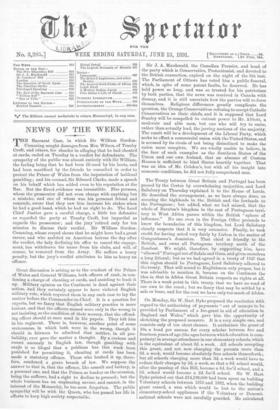Great discussion is arising as to the conduct of the
Prince of Wales and General Williams, both officers of rank, in con- doning a charge of cheating at cards, and assisting to hush it up. Military opinion on the Continent is dead, against their action, knd they certainly appear to have violated English military rule, which required them in any such case to lay the matter before the Commander-in-Chief. It is a question for experts, but we fancy that English military practice is more lenient, and that the officers named were only in the wrong in not insisting, as the condition of their secrecy, that the offend- ing officer should at once send in his papers. They left him in his regiment. There is, however, another point of some seriousness, in which both were in the wrong, though it should in fairness be admitted that neither, in all pro- bability, ever gave the matter a thought. By a curious and recent anomaly in English law, though gambling with carcls is so illegal that a publican has this week been punished for permitting it, cheating at cards has been made a statutory offence. Those who hushed it up, there- fore, condoned a grave breach of Jaw. We suppose the answer to that is, that the offence, like assault and battery, is a personal one, and that the Prince, as banker on the occasion, being the sufferer, had a right to decline to proceed; but the whole business has an unpleasing savour, and cannot, in the interest of the Monarchy, be too soon forgotten. The public sympathy will be with the Queen, who has passed her life in efforts to keep high society respectable.


































